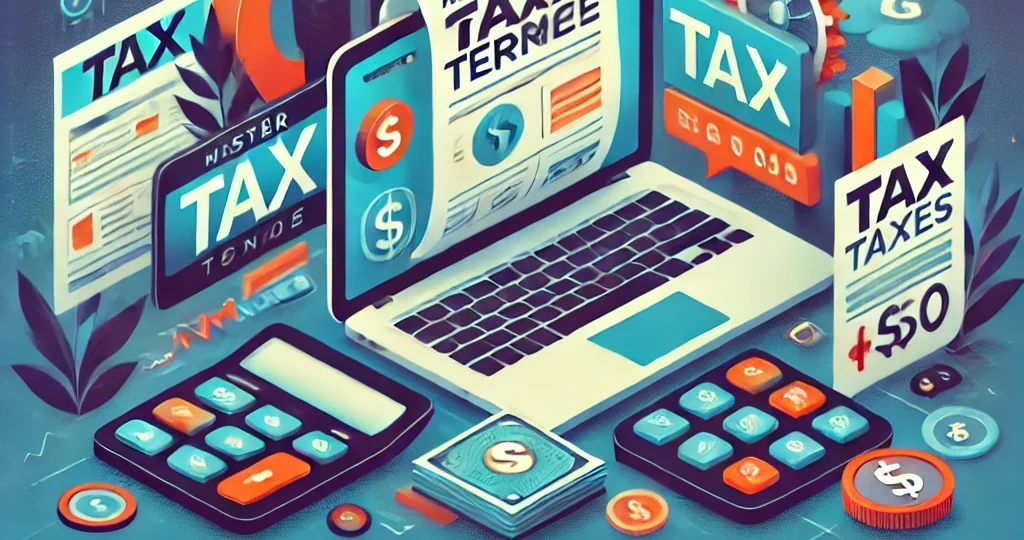Navigating the Tax Terrain: Essential Guide to Gig Economy Taxes
September 3, 2024 | by Jean

Taxes in the Gig Economy
Navigating the tax landscape in the gig economy is essential for freelancers and gig workers to comply with regulations and manage their finances effectively. Understanding gig economy taxes and your tax obligations is crucial for a successful and stress-free freelance career.
Overview of Gig Economy Taxes
Gig economy taxes refer to the tax responsibilities that individuals working in the gig economy must fulfill. Unlike traditional employment where taxes are typically withheld from paychecks, gig workers are often responsible for managing their own tax withholdings and filings. This means freelancers must track their earnings, deductions, and expenses throughout the year to accurately report income to the IRS.
One key aspect of gig economy taxes is the classification of workers as independent contractors rather than employees. This classification has implications for tax filing and liability, requiring gig workers to handle their own tax withholdings and self-employment taxes.
Importance of Understanding Tax Obligations
Understanding your tax obligations in the gig economy is crucial to avoid potential penalties and ensure compliance with tax laws. By staying informed about tax regulations and requirements that apply to freelancers and gig workers, individuals can proactively manage their finances and prepare for tax season.
It’s essential for gig workers to track their income from multiple sources and maintain detailed records of deductions and expenses to accurately report their earnings and minimize tax liabilities. By familiarizing themselves with tax forms specific to gig work and staying up-to-date on tax laws affecting independent contractors, freelancers can navigate the tax terrain efficiently.
For more detailed information on handling gig economy taxes, refer to our section on income reporting and deductions and expenses to ensure you are managing your tax obligations effectively.
Classifying Your Work
In the realm of the gig economy, it’s essential for individuals to understand how their work is classified, particularly in terms of being an employee or an independent contractor. This classification holds significant implications when it comes to tax filing obligations.
Employee vs. Independent Contractor
The classification as an employee or an independent contractor hinges on various factors governing the work relationship. Generally, an employee works under the direct control and supervision of an employer, often with set hours and specific tasks. In contrast, an independent contractor typically has more autonomy over how and when they perform their work, and may provide services to multiple clients.
Distinguishing between these classifications is crucial because it determines how taxes are handled. Employees have taxes withheld by their employer, including Social Security and Medicare taxes. On the other hand, independent contractors are responsible for paying self-employment taxes, including both the employer and employee portions of Social Security and Medicare taxes.
Implications for Tax Filing
The classification of your work affects the tax forms you use and how you report your income. Employees typically receive a W-2 form from their employer, which outlines their wages, taxes withheld, and other pertinent information for tax filing. On the other hand, independent contractors receive a Form 1099-NEC or Form 1099-MISC from clients who have paid them over a certain threshold during the tax year.
For independent contractors, it’s essential to keep detailed records of income and expenses related to their gig work. This documentation is pivotal for accurately reporting income and claiming any deductible expenses when filing taxes. Employers usually provide employees with a summarized breakdown of their earnings and withholdings, simplifying the tax reporting process for traditional employees.
Understanding the distinction between being an employee and an independent contractor not only impacts how taxes are paid but also influences the eligibility for certain tax deductions and benefits. By grasping the implications of your work classification, you can navigate the tax terrain of the gig economy more effectively and ensure compliance with tax laws.
Income Reporting
In the dynamic landscape of the gig economy, tracking income accurately is paramount for freelancers and gig workers to fulfill their tax obligations effectively. This section highlights the significance of monitoring income from multiple sources and understanding the various tax forms associated with different gig work.
Tracking Income from Multiple Sources
Freelancers and gig workers often engage in diverse income-generating activities across multiple platforms or clients. Keeping meticulous records of all sources of income is essential for accurate tax reporting. By maintaining detailed records, individuals can effectively track payments received from various gigs, platforms, or clients throughout the year.
It’s advisable to utilize digital tools such as spreadsheets or accounting software to streamline income tracking processes. Categorizing income sources can provide a clear overview of earnings and facilitate the identification of taxable amounts. Additionally, regularly reviewing income records can help detect discrepancies and ensure compliance with tax regulations.
Tax Forms for Different Gig Work
The gig economy encompasses a wide range of freelance activities, each with unique tax implications. Understanding the specific tax forms related to different types of gig work is crucial for proper income reporting and tax filing procedures. Below is a summary of common tax forms gig workers may encounter based on their work classification:
| Gig Work | Associated Tax Forms |
|---|---|
| Independent Contractor | Form 1099-MISC or Form 1099-NEC |
| Online Platform Work | Form 1099-K |
| Self-Employed Business | Schedule C (Form 1040) |
| Rental Income | Schedule E (Form 1040) |
| Investment Income | Form 1099-DIV, Form 1099-INT, Form 1099-B |
Different gig activities may necessitate the use of specific tax forms to report income accurately to the IRS. Familiarizing oneself with the appropriate forms corresponding to the nature of work undertaken can streamline the tax filing process and minimize errors.
By effectively tracking income from various sources and understanding the relevant tax forms associated with different gig work, freelancers and gig workers can navigate the complexities of income reporting in the gig economy with confidence and ensure compliance with tax laws. For more tips on maximizing income in the gig economy, check out our article on best microtask websites.
Deductions and Expenses
Understanding the deductions and expenses that can be claimed is essential for gig workers to optimize their tax situation. Here, we’ll explore the allowable deductions for gig workers and provide recordkeeping tips to ensure accurate reporting.
Allowable Deductions for Gig Workers
Gig workers can benefit from various deductions that help lower their taxable income, ultimately reducing the amount of tax owed. Some common deductions that gig workers may be eligible for include:
| Deduction Type | Description |
|---|---|
| Home Office Expenses | Deduct a portion of expenses related to your home office, such as utilities and rent/mortgage interest, based on the percentage of space used for work. |
| Vehicle Expenses | Deduct mileage or actual expenses related to business driving, such as gas, maintenance, and insurance. Keep detailed records of business-related trips. |
| Supplies and Equipment | Deduct expenses for necessary supplies, equipment, and software used for your gig work. This can include technology upgrades, office supplies, and software subscriptions. |
| Health Insurance Premiums | Deduct premiums paid for health insurance coverage, including medical, dental, and vision insurance. Self-employed individuals may be eligible for this deduction. |
| Professional Services | Deduct fees paid to professionals, such as accountants or lawyers, for services directly related to your gig work. Ensure to keep documentation of these payments. |
It’s important for gig workers to keep thorough records of expenses to substantiate their deductions during tax filing. Utilizing accounting software or apps can streamline this process and aid in organizing deductible expenses effectively.
For a more comprehensive list of deductions available to gig workers, consult with a tax professional who can provide personalized guidance based on your specific situation. Discover more tips and strategies for maximizing deductions by reading our article on tax efficiency for gig workers.
Recordkeeping Tips for Deductions
Maintaining detailed and accurate records is paramount for gig workers looking to claim deductions successfully. Here are some recordkeeping tips to help you stay organized throughout the tax year:
- Create Separate Accounts: Open a separate bank account and credit card for your gig-related transactions to easily track income and expenses.
- Keep Receipts: Retain receipts and invoices for all business-related purchases, both physical and digital. Store them in an organized manner for easy retrieval.
- Track Mileage: Use a mileage tracking app or a logbook to record business-related travel for accurate deduction of vehicle expenses.
- Maintain Electronic Records: Scan and store paper documents electronically to prevent loss and facilitate easy access when needed for tax purposes.
By diligently tracking your income and expenses, you can ensure that you are fully utilizing all eligible deductions when it comes time to file your taxes. Effective recordkeeping not only simplifies tax compliance but also helps optimize your tax savings as a gig worker. Explore more insights on financial planning for gig workers to enhance your financial management skills in the gig economy.
Estimated Taxes
Understanding the concept of estimated taxes is crucial for freelancers and gig workers who earn income that is not subject to withholding taxes. In this section, we will delve into what quarterly estimated taxes are, how to calculate them, and the process of making these payments.
Understanding Quarterly Estimated Taxes
Quarterly estimated taxes are payments made to the IRS by individuals who earn income that is not subject to traditional withholding, such as wages from an employer. For freelancers, gig workers, and self-employed individuals, estimating and paying taxes quarterly helps avoid underpayment penalties at tax time.
Estimated tax payments are due four times a year, typically in April, June, September, and January. By making these payments throughout the year, individuals can spread out their tax liability and prevent a large tax bill at the end of the year. It’s important to accurately calculate estimated taxes to ensure compliance with tax obligations.
How to Calculate and Pay Estimated Taxes
Calculating estimated taxes involves determining your expected annual income, deductions, and credits, then estimating your tax liability based on these factors. The IRS provides Form 1040-ES, which includes a worksheet to help you calculate the appropriate amount to pay each quarter.
To calculate estimated taxes:
- Estimate your total annual income from freelancing or gig work.
- Subtract any eligible deductions and credits to determine your taxable income.
- Calculate your estimated tax liability based on the current tax rates.
- Divide this annual tax amount by four to determine your quarterly payment.
Once you have calculated the amount due, you can make your estimated tax payments online through the Electronic Federal Tax Payment System (EFTPS), credit card, or by check. It’s important to pay attention to the due dates to avoid penalties for underpayment.
| Quarter | Due Date |
|---|---|
| 1st (Jan – Mar) | April 15 |
| 2nd (Apr – May) | June 15 |
| 3rd (Jun – Aug) | September 15 |
| 4th (Sep – Dec) | January 15 |
By understanding the process of estimating and paying taxes quarterly, freelancers and gig workers can effectively manage their tax obligations and avoid potential penalties. Proper planning and timely payments can lead to a smoother tax season and financial peace of mind. For more information on tax-related topics, check out our article on gig economy taxes.
Seeking Professional Help
When it comes to navigating the complexities of taxes in the gig economy, knowing when to seek assistance from a tax professional can be invaluable. Understanding the nuances of tax laws and regulations can be overwhelming, especially for independent contractors and freelancers. In this section, we will explore the importance of consulting a tax professional and the benefits of working with a tax advisor.
When to Consult a Tax Professional
Deciding when to consult a tax professional largely depends on the individual’s comfort level with tax matters and the complexity of their financial situation. Here are some scenarios where seeking guidance from a tax professional is recommended:
- Multiple Income Sources: If you earn income from various gig jobs or have a mix of freelance income and traditional employment, a tax professional can help you navigate the tax implications of each income stream.
- Complex Deductions: Determining which deductions are applicable to your gig work can be challenging. A tax professional can help you identify allowable deductions and ensure you maximize your tax savings.
- Estimated Taxes: Calculating and paying quarterly estimated taxes can be confusing for gig workers. A tax professional can assist in estimating the correct amount to avoid underpayment penalties.
- Tax Planning: For long-term tax planning strategies and optimizing your tax situation, a tax professional can provide personalized advice tailored to your financial goals.
Consulting a tax professional can provide peace of mind and ensure that your tax obligations are met accurately and efficiently. For detailed insights on estimated taxes, refer to our article on understanding quarterly estimated taxes.
Benefits of Working with a Tax Advisor
Collaborating with a tax advisor can offer numerous advantages for gig workers looking to streamline their tax responsibilities and minimize tax liabilities. Here are some benefits of working with a tax advisor:
- Expert Guidance: Tax advisors specialize in tax laws and regulations, providing expert guidance on tax optimization strategies specific to gig workers.
- Tax Compliance: By working with a tax advisor, you can ensure that you comply with all tax regulations, file accurate tax returns, and meet deadlines for estimated tax payments.
- Maximized Deductions: A tax advisor can identify deductible expenses unique to your gig work, helping you maximize deductions and reduce your taxable income.
- Audit Support: In the event of an audit, having a tax advisor can provide the support and representation needed to navigate the audit process successfully.
- Financial Planning: Tax advisors can offer insights on financial planning, retirement savings strategies, and investment opportunities tailored to your gig economy income.
By enlisting the support of a tax advisor, gig workers can gain a deeper understanding of their tax obligations, optimize their tax situation, and secure financial stability. For additional tips on deductions and expenses for gig workers, refer to our article on allowable deductions for gig workers.
RELATED POSTS
View all


